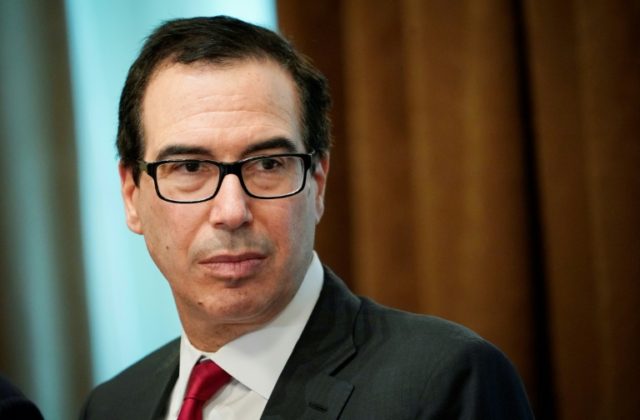Washington (AFP) – US Treasury Secretary Steven Mnuchin on Monday denounced media reports detailing plans to impose restrictions on Chinese investment in US companies and on tech exports to China.
The reports were widely cited Monday as helping to spark a global stocks selloff, with investors increasingly gloomy about the prospects of de-escalation in the emerging US-China trade war.
The White House in late May announced plans to impose steep tariffs on Chinese goods, and follow up by June 30 with “specific investment restrictions and enhanced export controls for Chinese persons and entities related to the acquisition of industrially significant technology.”
The Wall Street Journal and Bloomberg News cited several sources saying the heightened US scrutiny of Chinese investment would fall under emergency national security powers.
The law in question, the International Emergency Economic Powers Act, allows the president to regulate trade in response to foreign threats and has frequently been used to respond to armed conflict, weapons and narcotics trafficking and political instability.
The Wall Street Journal also said the investment restrictions would apply to companies with 25 percent Chinese ownership.
But Mnuchin said Monday the news reports were “false, fake news.”
“The leaker either doesn’t exist or know the subject very well,” he said on Twitter.
“Statement will be out not specific to China but to all countries that are trying to steal our technology,” Mnuchin said, even though that seems to contradict the White House statement issued May 29.
– Continued escalation –
US officials accuse China of using cyber-theft and forced transfers to steal the “crown jewels” of American innovation, allowing their own industries to advance unfairly.
Beijing on Monday said Chinese investment has created jobs and increased tax revenue in the US.
“China-US trade, investment and cooperation are mutually beneficial in nature,” Foreign Ministry spokesman Geng Shuang said at press conference.
“We hope the US can view Chinese companies’ commercial activities in an objective way, and provide a fair, sound and predictable investment environment,” Geng said.
The White House this month pressed ahead with plans to impose up to $50 billion on Chinese goods starting July 6.
The goods targeted are those US officials say are tied to Beijing’s “Made in China 2025” industrial development plan to achieve global dominance in emerging technologies such as artificial intelligence, robotics, aeronautics and new-energy vehicles.
After Beijing announced it would retaliate, Trump threatened another $200 billion in Chinese goods that could be subject to fresh tariffs and said this could rise by $200 billion if China responded further.
China, also affected by US steel tariffs, has denounced Trump’s approach as “extreme pressure and blackmail,” warning it would “take strong, powerful countermeasures” if the president enacts his threats.
The tensions, which for weeks have struck fear into the hearts of global investors, add to those sparked by the trade dispute between the United States and the European Union.
burs-dg/hs

COMMENTS
Please let us know if you're having issues with commenting.